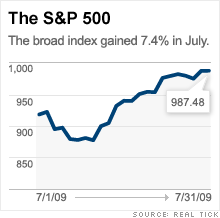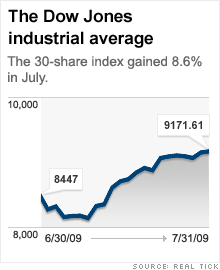Stocks: After the bull run
The best July in 20 years gives way to what could be a very choppy August on Wall Street.


NEW YORK (CNNMoney.com) -- The best July in 20 years has set Wall Street up for a tumultuous August, as investors look past the earnings surprises that fueled the run to the economic questions that remain.
Next week brings quarterly results from another 18% of the S&P 500 companies, including Dow components Cisco Systems, Kraft Foods and Procter & Gamble. Economic reports include readings on personal income and spending, retail sales and the labor market.
Investors will also be easing into the start of a typically low-volume month on Wall Street -- one that follows on the heels of a notably strong July.
"The story of July is the large number of companies that beat forecasts and all the portfolio managers that decided to put money to work," said Fred Dickson, chief market strategist at D.A. Davidson & Co.
He said that the momentum will slow in August, which could be something of a roller-coaster month. "We'll probably end up just higher than July."
The Dow gained 8.4% in July, its best performance since 1989, while the S&P 500 gained 7.4%, its best July showing since 1988. The Nasdaq's advance of 7.8% was its best July performance since 1997.
Both the S&P 500 and Nasdaq saw bigger monthly gains in April of this year, but for the Dow, July was its best month overall since October of 2002.
All about earnings: With over two-thirds of the S&P 500 having already reported results, profits are currently on track to have fallen 29% versus a year ago, according to earnings tracker Thomson Reuters.
Clearly, profits are still suffering amid the recession, but the results were expected to be worse. As of July 1, analysts were expecting year-over-year results to fall more than 35%.
Although led by financials, results have been beating expectations pretty much across the board, said John Butters, senior research analyst at Thomson Reuters. He said the utilities sector was the lone holdout.
"The theme is still that we are seeing an unusually high number of companies beat expectations," said Butters.
Around 74% of companies have beat forecasts, versus the long-term average of 61% and the all-time record of 73%, reached in the first quarter of 2004. Companies are also beating forecasts by the greatest amount since Thomson began tracking results 15 years ago, beating by an average of 13% versus the previous record of 7.1%. That record was also made in the first quarter of 2004.
But that cheer hasn't spilled over to third-quarter forecasts, with few companies or analysts lifting estimates. Currently, third-quarter profits are expected to dip 21.5% versus a year ago, according to Thomson. On July 1, analysts thought 3Q results would dip 20.9% year-over-year.
Here'a what's on tap for the week ahead:
Monday: Humana (HUM, Fortune 500) and Marathon Oil (MRO, Fortune 500) are among the companies reporting results in the morning, but neither are typically market movers.
Tuesday: Dow component Kraft Foods (KFT, Fortune 500) is due to report results after the close of trading. Kraft is expected to have earned 54 cents per share versus 58 cents a year ago.
Wednesday: Dow component Procter & Gamble (PG, Fortune 500) reports results in the morning. The consumer products firm is expected to have earned 79 cents per share versus 80 cents a year ago.
Dow component Cisco Systems (CSCO, Fortune 500) is expected to report results after the close of trading. The tech leader is expected to have earned 28 cents versus 40 cents a year ago.
Other companies due to report results Tuesday evening include Allstate (ALL, Fortune 500), Prudential (PRU, Fortune 500) and Sunoco (SUN, Fortune 500).
Thursday: Comcast (CMCSA, Fortune 500) and DIRECTV (DTV, Fortune 500) report results in the morning, but neither are usually market movers.
Friday: No notable financial reports are due.
Monday: The Institute for Supply Management releases its July manufacturing index shortly after the start of trading. The index is expected to have improved to 46.5 from 44.8 last month, according to a consensus of economists surveyed by Briefing.com.
The Senate will vote on a bill that would add $2 billion to the popular Cash For Clunkers program, which has been running low on funds. The House of Representatives approved the bill Friday. The program gives consumers who buy fuel-efficient cars refund vouchers worth as much as $4,500 on traded-in gas guzzlers.
Reports on July auto and truck sales are due in the afternoon. Sales are expected to show the impact of the Cash for Clunkers program.
The June construction sales report from the Commerce Department is also due in the morning.
Tuesday: The Commerce Department releases its June readings on personal income and spending before the start of trade. Income is expected to have fallen 1% after rising 1.4% in the previous month. Spending is expected to have risen 0.3% after rising 0.2% in the previous month.
The June Pending home sales index from the National Association of Realtors is due in the morning. The index is expected to have risen 0.3% after rising 0.1% in May.
Wednesday: The July reading on private-sector employment from payroll services firm ADP is due in the morning. Employers are expected to have cut 340,000 jobs from their payrolls after cutting 473,000 in the previous month.
The ISM services sector report from the Institute for Supply Management is due in the morning. The index is expected to have dipped to 48 in July from 48.8 in June.
The June factory orders report from the Commerce Department is also due in the morning, as is the weekly oil inventories report from the Energy Information Administration.
Thursday: The weekly jobless claims report is due in the morning from the Labor Department.
Additionally, July sales figures from the nation's retailers are due throughout the morning.
Friday: The July jobs report from the Department of Labor is due to be released shortly before the start of trading. Employers are expected to have cut 333,000 jobs from their payrolls after cutting 467,000 jobs in the previous month.
The unemployment rate, generated by a separate survey, is expected to have risen to 9.6% from 9.5%.
In the afternoon, a report on consumer credit is due, although its not usually a market mover. ![]()

